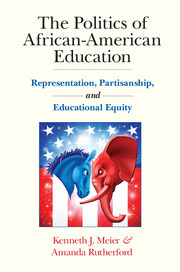Book contents
- Frontmatter
- Dedication
- Contents
- List of Figures
- List of Tables
- Preface
- 1 Representation, Partisanship, and Equality in Education
- 2 Two Myths: Separate but Equal and Nonpartisan Education
- 3 The Politics of African- American School Board Representation: Partisanship, Structure, and Resources
- 4 Race and Street- Level Bureaucrats: With a Little Help from My Friends
- 5 Partisanship, Teacher Representation, and Access to Education Opportunities
- 6 Race, Politics, and Student Learning
- 7 Can You Beat the Ovarian Lottery?
- References
- Index
5 - Partisanship, Teacher Representation, and Access to Education Opportunities
Published online by Cambridge University Press: 05 August 2016
- Frontmatter
- Dedication
- Contents
- List of Figures
- List of Tables
- Preface
- 1 Representation, Partisanship, and Equality in Education
- 2 Two Myths: Separate but Equal and Nonpartisan Education
- 3 The Politics of African- American School Board Representation: Partisanship, Structure, and Resources
- 4 Race and Street- Level Bureaucrats: With a Little Help from My Friends
- 5 Partisanship, Teacher Representation, and Access to Education Opportunities
- 6 Race, Politics, and Student Learning
- 7 Can You Beat the Ovarian Lottery?
- References
- Index
Summary
Politics and structure clearly shape the access of African Americans to policy-making positions in public education. Chapter 3 demonstrated the interaction of both electoral structure and partisanship and their combined influence on the ability of African Americans to gain access to seats on the school board. Chapter 4 traced both of these factors on the ability of African-American school board members to hire African-American administrators and teachers. Although electoral structure mattered in both chapters, the most important substantive finding was how partisanship permeated the entire process. Partisanship permitted blacks to overcome the biases of at-large elections and make such a system work for them rather than against them. Similarly, partisanship created allies (friends) that black politicians could rely on to gain allocative responsiveness in the form of more African-American administrators and teachers. These political and representational processes matter, however, only to the extent that they affect the educational experiences of African-American students. This topic is the subject of Chapters 5 and 6. This chapter will examine a set of processes within schools that are often associated with second-generation educational discrimination – access to gifted classes, assignments to special education, and the use of discipline. Chapter 6 will continue this process into the era of No Child Left Behind and high stakes educational testing to look at student performance on standardized tests and other educational outcomes. In both chapters the key explanatory variable will be African-American representation.
Similar to previous chapters, this chapter will continue to focus on both structure and partisanship; however, the focus on structure will shift from electoral structure to the broader structural dimensions of school district governance. Chapter 3 found that partisanship altered the intended influence of structures and that structural biases could be used to benefit African Americans when the partisan environment was favorable. Chapter 4 demonstrated that partisanship was more important than structure in enhancing the impact of political representation on allocative responsiveness. As analyses shift to policy outputs and outcomes, how school board members are elected has little direct influence on the representation process (other than by increasing the number of bureaucratic representatives). The structures more likely to matter are those of the independent school district; these structures create distinct roles for school board members, school administrators, and teachers. Further, these structures enhance or reduce the relative ability of the three sets of representatives to influence student outputs in predictable ways.
- Type
- Chapter
- Information
- The Politics of African-American EducationRepresentation, Partisanship, and Educational Equity, pp. 108 - 136Publisher: Cambridge University PressPrint publication year: 2016



